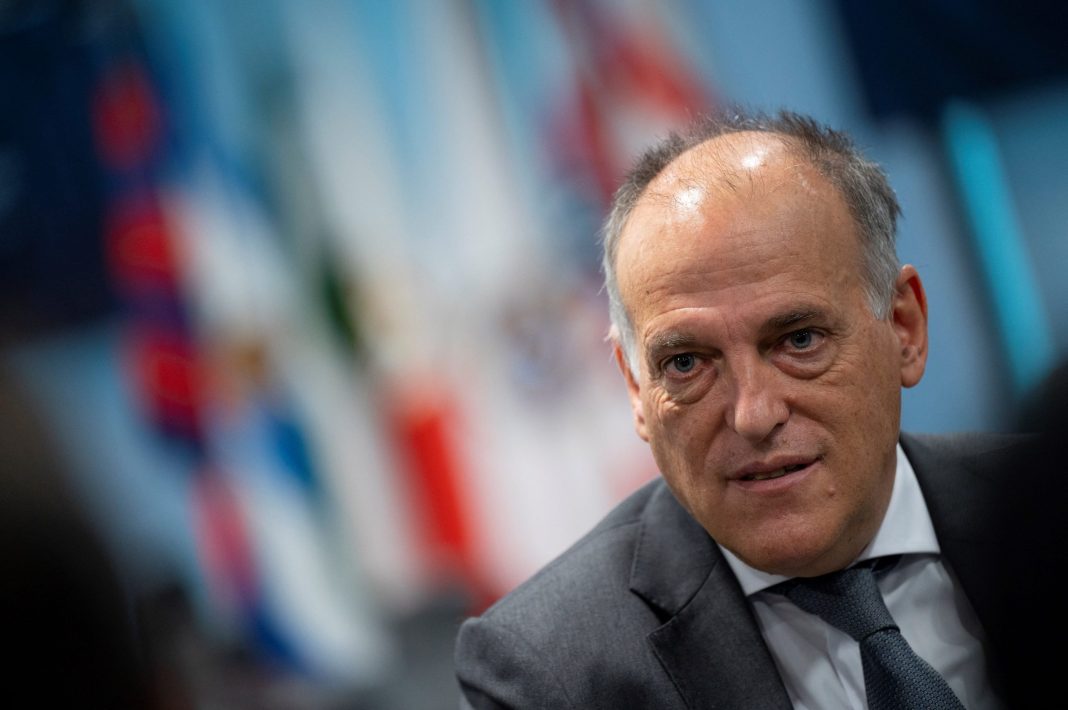Javier Tebas Critiques Real Madrid President Amid Copa del Rey Final Controversy
As the Copa del Rey final approaches, tensions have escalated in the football world, particularly surrounding Real Madrid and its president, Florentino Pérez. In an unexpected turn of events, La Liga president Javier Tebas took to social media to express his dissatisfaction regarding the ongoing drama, signaling a deeper rift within Spanish football. This controversy stems from perceived grievances that Real Madrid has towards various football authorities, including referee decisions that have prompted outrage among the club’s supporters.
Tebas, although not explicitly naming Pérez in his remarks, directed his criticism towards the issues that have been attributed to the Real Madrid president. The political landscape of football is complex, and the context of these comments reveals a growing frustration within the football establishment regarding Pérez’s approach to leadership. His style, which many view as increasingly authoritarian, raises significant concerns about the future of cooperation among clubs. The football community is left to ponder the implications of these tensions, especially in the run-up to crucial matches where unity and compromise are essential.
Using his platform on X, Tebas delivered a pointed message that seemed to underscore a bigger issue within football governance, stating, “This isn’t football, it’s power grabs.” His statement captures the essence of his argument that some figures in the sport are notably more focused on asserting control than fostering a collaborative environment. It raises the question of whether the sport is evolving into a battleground where personal agendas overshadow the fundamental values of teamwork and fair play, elements that initially drew fans to football.
According to Tebas, Pérez’s frustrations extend to a wide array of football authorities and stakeholders. He articulated how the Real Madrid president’s discontent stems from a desire for absolute conformity to his expectations. In a telling observation, Tebas mentioned, “He doesn’t like Tebas because he doesn’t do what he wants. He doesn’t like Ceferin because he doesn’t do what he wants.” This statement emphasizes the lack of alignment between Pérez and those in positions of authority who do not acquiesce to his demands, highlighting a power struggle that extends beyond individual personalities to the governance of football itself.
Tebas’s critique further elaborated on Pérez’s relationships within the sport, noting how even TV commentators have come under scrutiny for failing to present viewpoints that align with the Real Madrid president’s preferences. He stated, “He doesn’t like Louzan because he doesn’t do what he wants. He doesn’t like the TV commentators because they don’t say what he wants.” This commentary reflects a troubling trend where dissenting voices are sidelined in favor of a singular narrative that serves Pérez’s interests. This environment stifles debate and undermines the integrity of sports journalism, as commentators may be pressured to align with Pérez’s views rather than providing an objective analysis of matches and events.
Accusations of Manipulation and Control
In a more intense critique, Tebas accused Pérez of manipulating the situation to maintain his grip on power. He suggested that rather than engaging in constructive dialogue with other stakeholders in the football community, the Real Madrid president resorts to tactics that suppress dissent. Highlighting this behavior, he remarked, “And now, after the referees’ statements—fed up with the constant harassment from Real Madrid TV—he’s responding as he knows how: He’s cancelling the press conference. He’s skipping training at La Cartuja. He’s disregarding the official Copa del Rey final events.” This assertion paints a picture of a leader who prioritizes personal control over the spirit of the game, demonstrating a willingness to forgo traditional practices in pursuit of his agenda.
The criticisms didn’t stop there. Tebas took a strong stand against what he perceives as Pérez’s threats and intimidation tactics. He claimed that Real Madrid’s actions are more about controlling the narrative than fostering genuine improvement in the football ecosystem. He stated, “What a thin skin. He does not protest, he pressures. He doesn’t complain, he threatens. He doesn’t disagree, he punishes.” This characterization of Pérez as a figure who manipulates rather than leads is alarming to many observers of the sport and raises questions about the ethical standards that should govern football administration.
Furthermore, Tebas highlighted a more systemic issue within the sport: the enabling of such behavior by others in the football community. He expressed concern that Pérez’s desire to dominate the game is supported by various stakeholders who either turn a blind eye or actively assist him in this agenda. Concluding his remarks, he stated, “He doesn’t want to improve the game, he wants his game. And the worst thing isn’t that he tries. The worst thing is that many allow it, consent to it, and help him.” This sobering statement challenges the integrity of the football governance structure and calls for a reevaluation of priorities within the sport, urging all involved to prioritize the collective good over the ambitions of any single individual.
The Copa del Rey final now serves as a critical backdrop for these unfolding events, as the actions and responses of both Tebas and Pérez will undoubtedly rekindle discussions around leadership, power dynamics, and the future direction of La Liga. As the football community grapples with these issues, the importance of transparency, accountability, and collaboration becomes increasingly apparent. With tensions running high, fans, analysts, and players alike are left to wonder how this conflict will shape the narrative of Spanish football moving forward, and what it suggests about the balance of power in the sport.
In conclusion, the remarks made by Javier Tebas serve not just as a critique of one individual but as a rallying cry for the entire football community to reassess its values and principles. The approaching Copa del Rey final is not merely a match; it represents a pivotal moment in which the sport’s integrity hangs in the balance. As stakeholders in football, it is essential to advocate for an environment where cooperation trumps conflict, ensuring that the beautiful game remains just that—a game, rather than a power struggle. In navigating this challenging landscape, the priorities of football must align with its foundational values, encapsulating the essence of teamwork, fairness, and respect for the game.

















